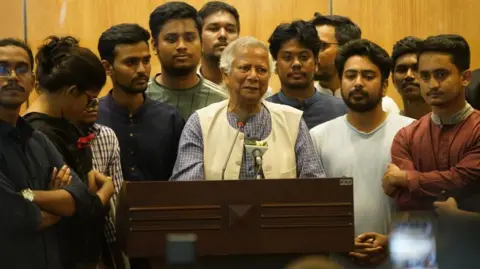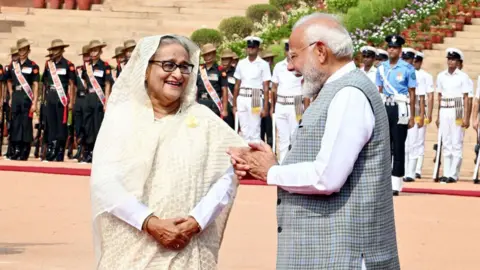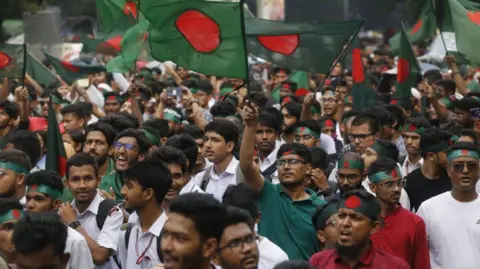 Getty Images
Getty ImagesThe relationship between neighbours India and Bangladesh continues to remain frosty more than a month after former prime minister Sheikh Hasina was ousted from power. While Hasina’s stay in India remains an irritant, a recent interview by Bangladesh’s interim leader Muhammad Yunus also took India by surprise. The BBC’s Anbarasan Ethirajan examines where ties stand now.
Sheikh Hasina was seen as pro-India and the two countries enjoyed close strategic and economic ties during her 15-year rule. Her time in power was also beneficial for India’s security, as she cracked down on some anti-India insurgent groups operating from her country and settled some border disputes.
But her presence in India, with no clarity on how long she will stay, complicates the two countries’ efforts to maintain a strong relationship.
That was made clearer last week when, in an interview with news agency Press Trust of India, Yunus urged India to stop Hasina from making any political statements while staying in Delhi.
“If India wants to keep her until the time Bangladesh wants her back, the condition would be that she has to keep quiet,” said Yunus, a Nobel Peace Prize laureate who is currently leading an interim administration after Hasina’s exit.
Yunus may have been referring to a statement released days after Hasina’s arrival which had stoked anger in Bangladesh. She has not issued any public communication since then.
There have been calls within Bangladesh to bring Hasina back to stand trial for killings of people during the anti-government protests in July and August.
Yunus also said in the interview that both countries need to work together to improve their bilateral relationships, which he described as being “at a low”.
India’s foreign ministry has not formally reacted yet to the remarks, but officials are reportedly “upset”.
“India is waiting and watching developments in Bangladesh, taking note of statements emanating from Dhaka representing both official views and views expressed by prominent individuals,” an Indian official told the BBC on condition of anonymity.
Former Indian diplomats say they are taken aback by what has been described as “megaphone diplomacy” by Yunus – trying to discuss contentious bilateral issues through the media.
 Getty Images
Getty Images“India has indicated its readiness to talk to the interim government, and to discuss all concerns, those of Bangladesh and those of India,” Veena Sikri, a former Indian high commissioner in Dhaka, said.
The retired diplomat says the issues merit quiet discussions and it’s not clear “on what basis [Yunus] has described the bilateral relationship as low”.
But Bangladesh’s foreign ministry rejects the criticism.
“Don’t Indian leaders talk to any media? If Dr Yunus is asked about specific issues, he can of course express his views. If you want to criticise, you can criticise about anything,” Touhid Hossain, adviser to the Bangladesh foreign ministry, told the BBC.
Though Indian Prime Minister Narendra Modi and Yunus spoke on the telephone some weeks ago, there have been no ministerial level meetings so far.
There seems to be a broad consensus in India that Hasina can stay until another country agrees to let her in.
However, the newly appointed chief prosecutor of Bangladesh’s International Crimes Tribunal, Mohammad Tajul Islam, has said they are taking steps to extradite her to face charges in connection with the killings during the protests.
“As she has been made the main accused of the massacres in Bangladesh, we will try to legally bring her back to Bangladesh to face trial,” Islam told reporters.
But experts say it’s unlikely that Hasina will be extradited even if Bangladesh makes a formal request.
“She is staying here as a guest of India. If we don’t extend basic courtesy to our long-time friend, then why would anyone take us seriously as a friend in future?” says Riva Ganguly Das, who is also a former Indian high commissioner to Dhaka.
In his interview, Yunus also criticised Delhi for not reaching out to Bangladeshi opposition parties.
“The narrative is that everybody is Islamist, the Bangladesh Nationalist Party (BNP) is Islamist, and everyone else is Islamist and will make this country into Afghanistan. And Bangladesh is in safe hands with Sheikh Hasina at the helm only. India is captivated by this narrative,” he said.
But Indian analysts differ.
“I absolutely do not agree with that statement. In Bangladesh, our high commissioners talk to all political parties without ascribing any labels,” says Ms Sikri.
During the previous BNP-led coalition government from 2001 to 2006, the bilateral relationship deteriorated, with Delhi accusing Dhaka of harbouring insurgents from India’s north-east. The BNP denies this.
 Getty Images
Getty ImagesBut many in Bangladesh point out that India should be reaching out to the BNP, which is confident of winning the election whenever it is held.
“No Indian official has met us since 5 August [when Hasina’s government fell]. I don’t know the reason,” says Mirza Fakhrul Islam Alamgir, secretary general of the BNP.
On the contrary, the Chinese ambassador in Dhaka and envoys from European countries have been holding regular meetings with the BNP.
The lack of security in the days after the fall of Hasina has also given rise to attacks on religious minorities by suspected Islamists. India has already expressed concern several times over reports of attacks on Hindus.
In the past few weeks, several Sufi shrines, locally known as mazars, have also been vandalised by Islamist hardliners. Sunni Muslims are the majority in Bangladesh, and radicals consider shrines and tombs of revered figures un-Islamic.
“A group of people came and vandalised my father-in-law’s tomb a few days ago and warned us not to perform any un-Islamic rituals,” said Tamanna Akhtar, wife of the caretaker of the shrine of Ali Khawaja Ali Pagla Pir in Sirajganj district.
The adviser to the Bangladeshi religious affairs ministry, AFM Khalid Hossain, has said that action would be taken against those who target religious sites.
But experts say that if Islamist hardliners re-establish an assertive presence, however small it may be, in Bangladesh, it will set off alarm bells for Delhi.
In the past few weeks, a convicted Islamist militant has been released. Nine suspected radicals escaped during a jail break last month – four of them were arrested later.
Jashimuddin Rahmani, chief of the Ansarullah Bangla Team, which was designated as a terror outfit by Hasina’s government in 2016, walked out of prison last month.
He was sentenced to five years in prison in 2015 in connection with the murder of an atheist blogger. He had been in jail even after his prison term ended because of other pending cases.
“Several militants have been freed in the past month. Some of them are known to India,” former diplomat Ms Das said, terming it a “serious matter”.
Additional reporting by Mukimul Ahsan, BBC Bengali Service, Dhaka










